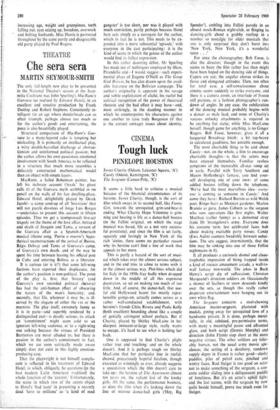Che sera sera
THEATRE MARTIN SEYMOUR-SMITH
The only full-length new play to be presented in the National Theatre's season at the Jean-
netta Cochrane was John Spurling's MacRune's Guevara (as realised by Edward Hotel), in an excellent and creative production by Frank Dunlop and Robert Stephens. Consistently in- telligent (in an age where dunderheads can so often triumph, perhaps almost too much so for the author's good) and entertaining, the piece is also beautifully played.
Structural comparison of MacRune's Gue- vara to a many-layered cake is tempting but misleading. It is primarily an intellectual play, a witty double-barrelled discharge at abstrac- tionism and uninformed political passion; but the author allows his own passionate emotional involvement with South America to be reflected
in a structure that much more resembles a delicately constructed mathematical model than an object with simple layers.
MacRune, a failed Bohemian painter, has left his inchoate account (Wash,' his ghost calls it) of the Guevara myth scribbled in um pencil on the walls of his last dwelling-place. Edward Hotel, delightfully played by Derek Jacobi—a camp send-up of all 'historians' that will not puzzle devotees of Jorge Luis Borges —undertakes to present this account in fifteen episodes. Thus we get a (compressed) five-act tragedy on the theme of the love affair, betrayal and death of Joaquin and Tania, a version of the Guevara affair as a Spanish-Americaft
musical (theme song, 'Patna o muerte), hypo- thetical reconstructions of the arrival of Bustos,
Regis Debray and Tania at Guevara's camp, of Guevara's own death, and of the way he spent his time between leaving his official post in Cuba and entering Bolivia as a liberator.
It is curious (or is it?) that some left-wing factions have reported their displeasure, for the author's position is non-political. The point of the play is, first, that 'history' (and Guevara's own recorded political rhetoric) has had the anti-human effect of obscuring the nature of the man's humanity; and, secondly, that life, whatever it may be, is ill-
served by the slogans of either the CIA or the
marxists. The play itself, extremely funny as it is in parts—and superbly rendered by a distinguished cast—is deadly serious; its attack on `commitment' might seem cold to an ignorant left-wing audience, or to a right-wing one sulking because the virtues of President Barrientos are never alluded to; but there is passion in the author's' commitment to fact, which we are soon satirically made aware simply does not exist in this highly emotion- producing case.
That the playwright is not himself compla- cent is reflected in his treatment of Edward Hotel, in which, obliquely, he questions (in the best modern Latin American traditicl) the whole function of the 'creator.' Unfortunately, the scene in which two of the actors object to Hotel's 'bad taste' in presenting a recently dead 'hero to millions' as 'a kind of mad
gangster' is too short, nor was it played with much conviction, partly perhaps because Hotel here acts simply as a surrogate for the author, which in fact he is not. This needs to be ex- panded into a more substantial 'episode,' with everyone in the cast participating: it is the kind of scene in which the genius of the author would find its fullest expression.
In this rather daunting debut, Mr Spurling has made use of techniques employed by Shaw, Pirandello and—I would suggest—such experi- mental plays of Eugene O'Neill as The Great God Brown; he has also drawn upon the avail- able literature on the Bolivian campaign. The author's originality is apparent in his savage and subtle exploitation of cliche, his rueful but satirical recognition of the power of theatrical rhetoric and the bad effect it may have—and, most strikingly, in the dazzling manner in which he counterpoints his characters against one another to raise truly Borgesian (if that is the correct coinage) issues about identity.


































 Previous page
Previous page